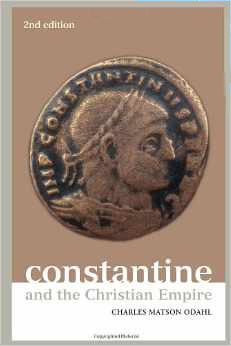CH101 - The Fourth Century
The Church Established, 303 - 400 A.D.Outline
Diocletian and Church Growth
The "Great" Persecution under Diocletian
Constantine becomes the Emperor
Initial Heresies (Donatus - Arius)
The Faith of Constantine
The Council of Nicea, 325AD
The Nicean Creed
Post-Nicean History
Christianity - Post Nicea
These pages are coming soon:
- Fourth Century Orthodoxy
- Death of Constantine
- Julian the Apostate
- Jovian-Valentinian and Valens
- Christianity becomes the Official Religion
Constantine and Faith
It is important to realize that Constantine always pushed for peace and unity in the church. He was not as concerned with the theological or doctrinal issues as he was to push for unity. We will see later in the discussion on the Council of Nicea that Constantine's goal was unity in the church.
Constantine, Faith and the Sun God
Many critics of Constantine maintain that his actions towards the Church were motivated by his political aspirations. It is commonly asserted that his Christian profession was not genuine, and that he continued to worship the Sun.
All notations on the remainder of this page are to Odahl's work.
The story derived from all of these records actually show that Constantine seemed to act in genuine Christian charity. Odahl shows through an extensive survey of the documentary evidence and coins minted that Constantine never worships the Sun or any pagan god after his conversion in 312AD.
Sol Invictus was displayed on the Arch of Constantine which had been commissioned by the Senate. They had sensed that the Emperor was not forbidding symbols of Sun worship, thus they included it. Indeed Constantine seems to have learned that Christians had been co-opting the Sun symbol for more than 100 years. The coins the Emperor minted for the 10th anniversary of his reign depicted him with a helmet adorned with the Christogram cross (Chi Rho symbol). p.143,44
Even the Senate and pagan authors complain that he stops worshipping with them while taking every opportunity to worship with the Christians. During these celebrations, Constantine declined to participate in the pagan worship, yet joined in Christian worship. Some scholars believe this may have been the beginning of Constantine losing the support of the Senate. p.338n40
It must also be remembered that prior to Constantine early Christians co-opted aspects of Sun worship. Clement of Alexandria portrays Christ, like the Sun-god, racing his chariot across the sky. Many pagans accused the Christians of Sun worship because they met on Sunday mornings - the early Christians did this to celebrate "the Lord's Day" as opposed to the Jewish Sabbath. Early in the fourth century the birthday of the Sun-god was co-opted as the day to celebrate the nativity of Jesus - there is no clear record of who started this tradition.
Considering these facts, perhaps it is less striking that Constantine continued to use the Sun on his coins and other imperial emblems. It was very clear, however, from his various letters that he considered himself a Christian and the imperial leader of the Church. It is true that Constantine was not baptized until he lay on his death bed, but this was not uncommon due to the issues of second repentance.
The Christian writers (Eusebius and Lactantius) of the day believed Constantine was a genuine Christian, pagan writers attacked him for neglecting pagan worship and we have several of his letters that clearly speak and sound like a person of genuine faith. Could he have been playing the hypocrite? Yes, but if you study his family and his entire life, it is more likely that he is a genuine, yet flawed Christian.

Numerous CH101 readers have written to me with questions and critical comments about what I have written regarding Emperor Constantine. There is a significant percentage of conservative Protestants who believe Christianity suffered greatly under Constantine. As a young man I was taught that the Catholic Church started with Constantine and was the beginning of Christianity losing its way.
One reader expressed it very close to how I learned it as a young man:
Emperor Constantine comes to Power
Emperor Constantine and Christian Faith
Emperor Constantine at the Council of Nicea
Emperor Constantine and Worship of the Sun (Sol Invictus)
Emperor Constantine and Christians in the Military
Emperor Constantine Against the Donatists
ist Century Church History
The conversion of the apostle Paul
Early Church History of Galatians
James Just brother of Jesus in the Bible
1st Century Christian Church Struggles
Christian History - conversion Apostle Paul
Palestine - Philo, Josephus, Strabo, Aristotle
Apollos NT Hebrews in Ancient Rome
Apollos NT Hebrews in the Bible
Wine in Bible Alcoholic?
James the Just and Jesus in the Bible
The Apostolic Fathers
Ignatius of Antioch - Barnabas
The Shepherd of Hermas - Polycarp
Gnostics and Gnosticism - Marcion
Justin Martyr - Ireneaus of Lyons
Spirit of Martyrs - Second Repentance
Clement of Alexandria - Paidagogus-Stromateis
The New Testament Canon
The Apostles Creed and the Roman Creed
Second Century Apologists
New Testament Canon - 3rd Century
Severan Persecution - Clement, Origen of Alexandria
Origenist Controversy - First Principles - De Principii
Roman Persecution under Decian
Cyprian of Carthage North Africa
New Testament Canon - 3rd Century
Emperor Valerian Persecution
De Lapsis, On the Lapsed by Cyprian
Diocletian Tetrarchy - Church Growth
The Great Persecution of the Church
Constantine Becomes the Emperor
4th Century Heretics - Donatus and Arius
Constantine's Conversion and Christian Faith
The Council of Nicea 325AD
The Nicene Creed - Homoousias and Orthodoxy
The New Nicene Orthodoxy and Conflict
The Death of Constantine - Julian the Apostate
Jovian - Valentinian I and Valens
Christianity Official Religion - Edict of Thessalonika
docs HF